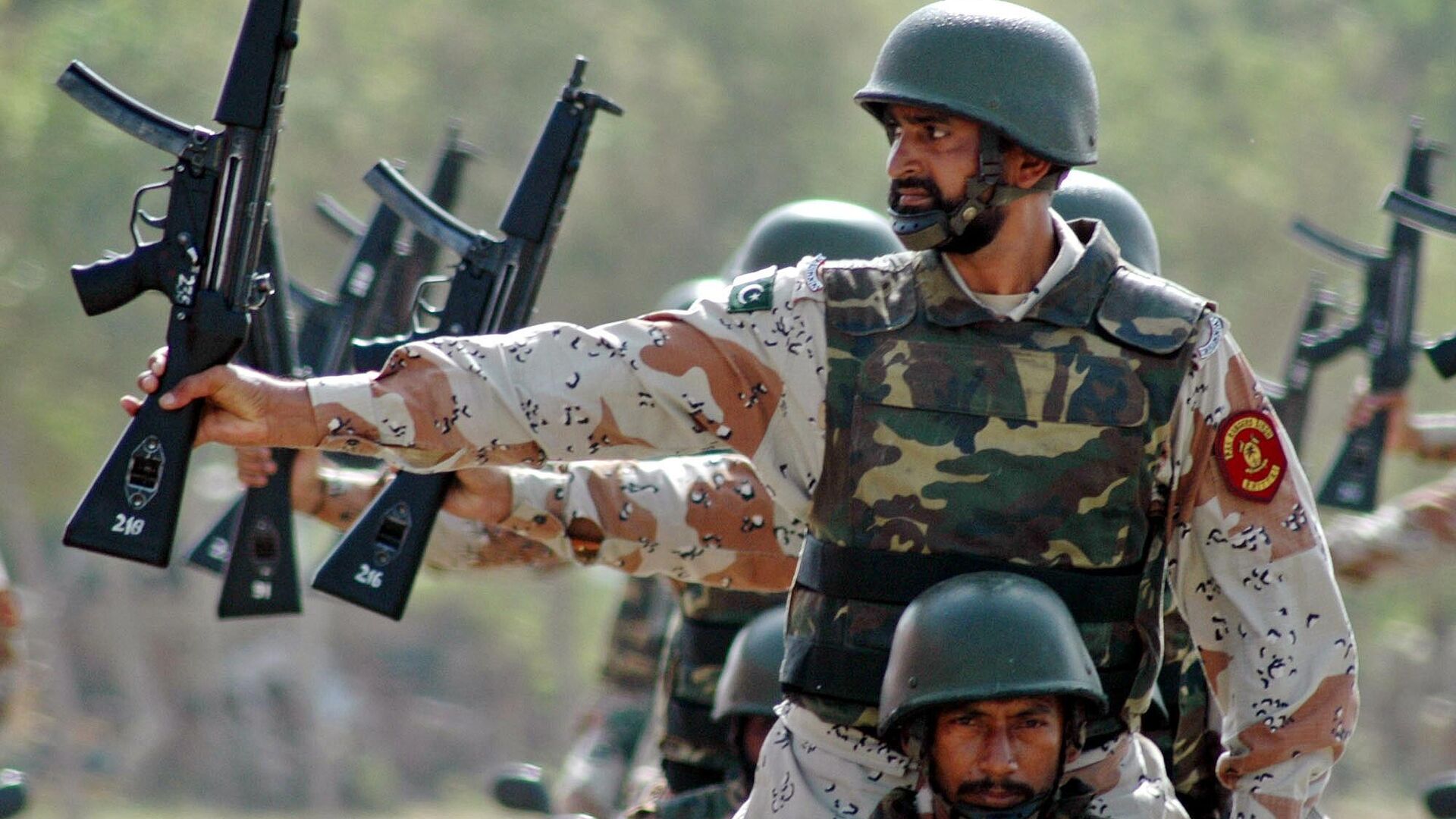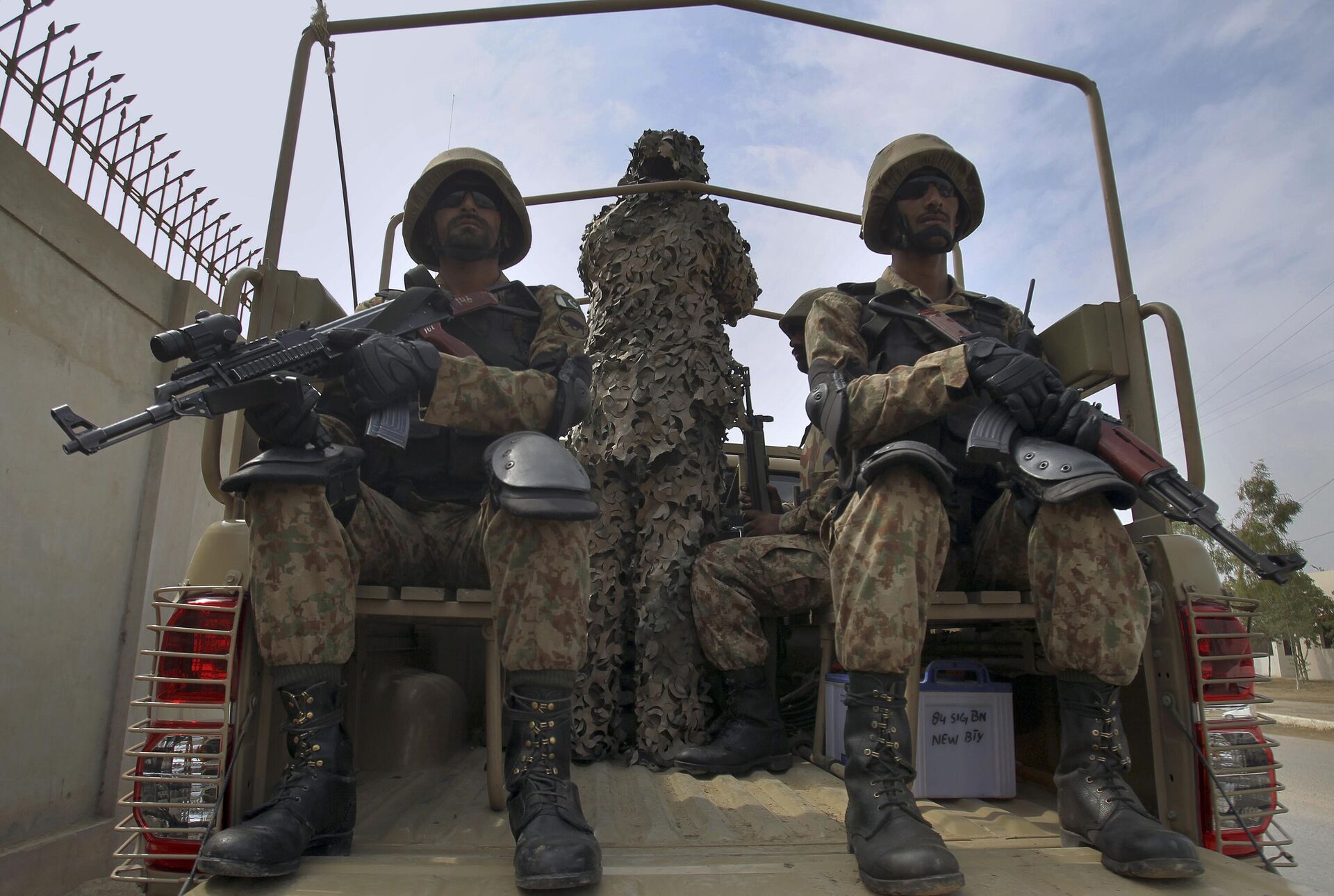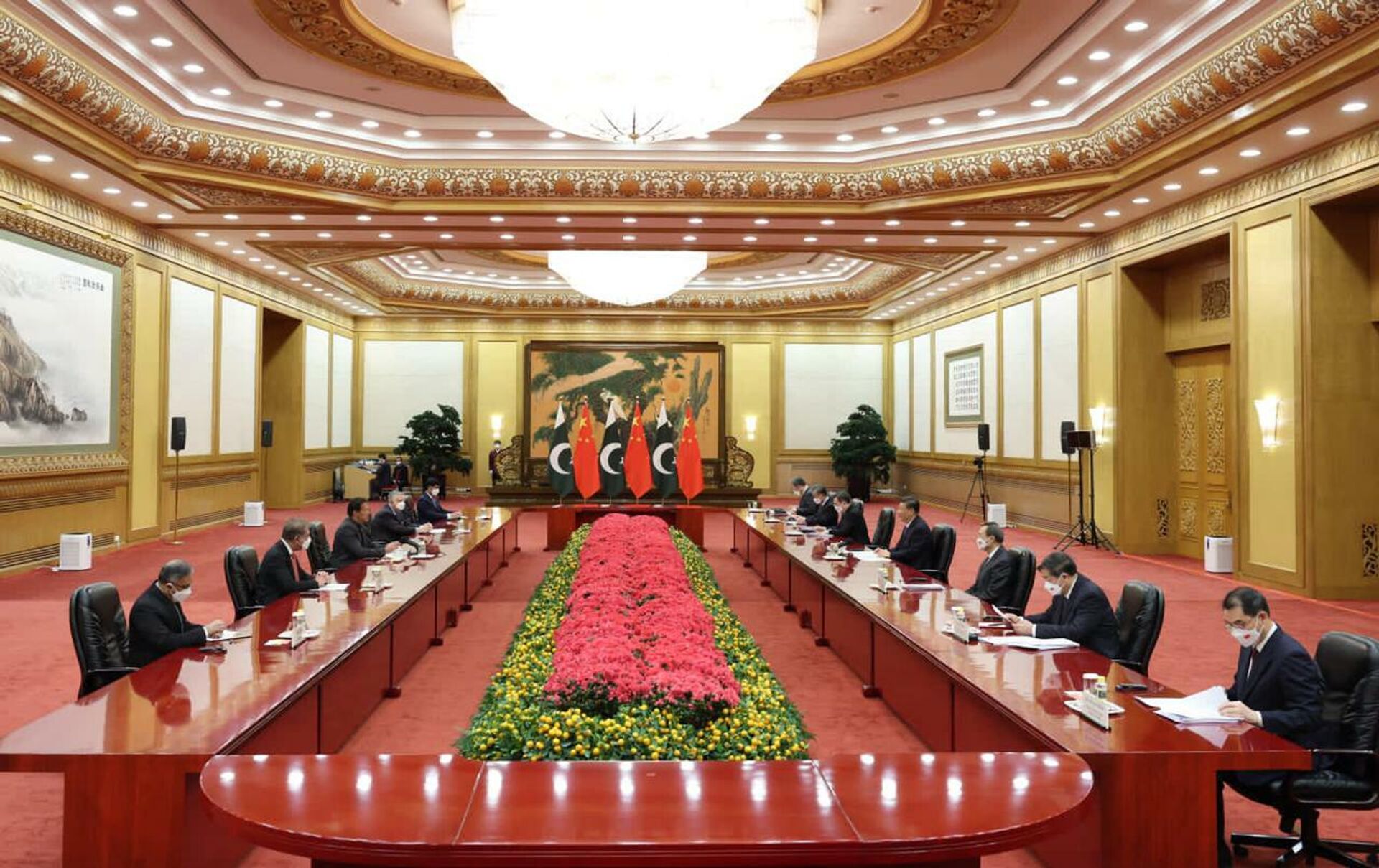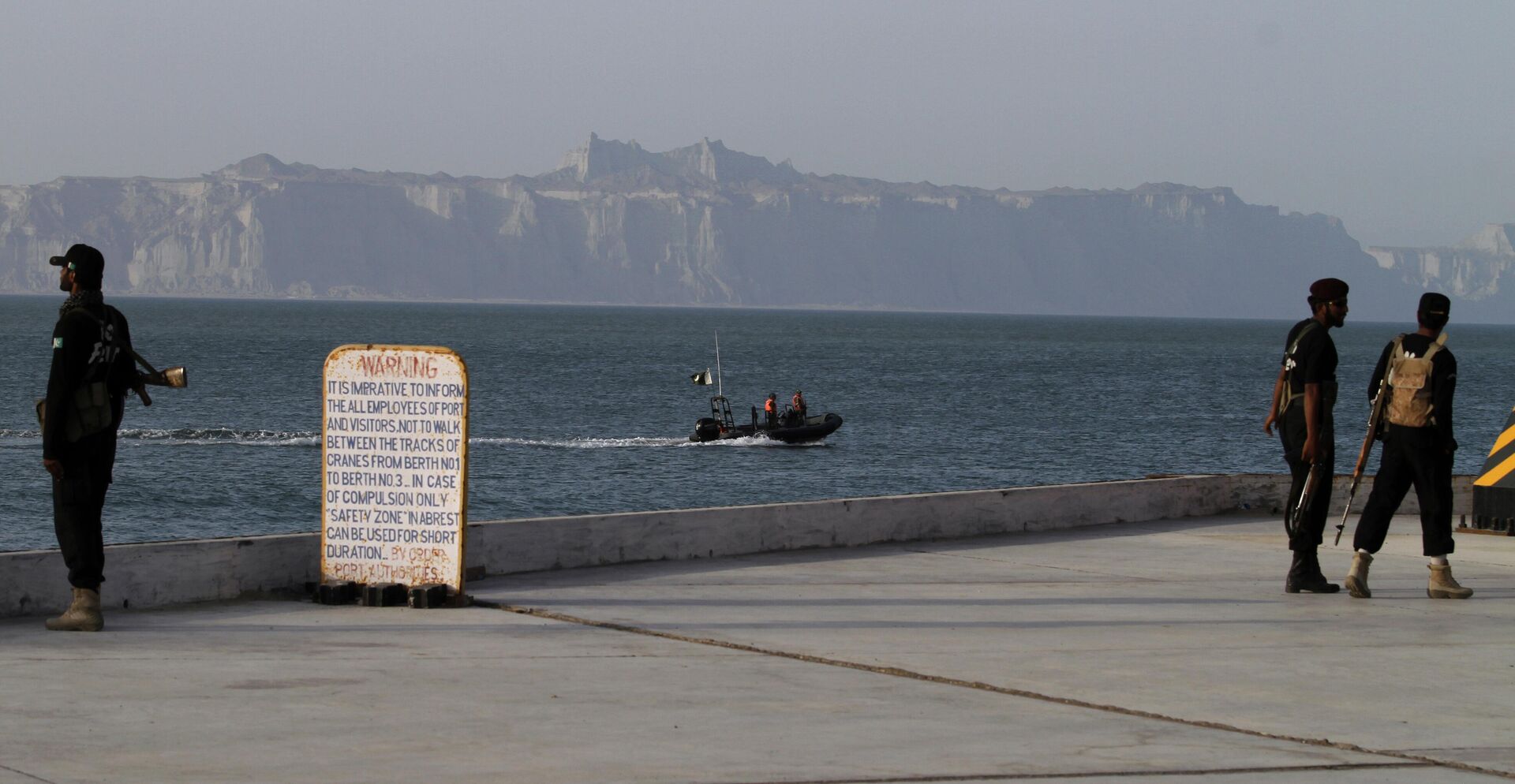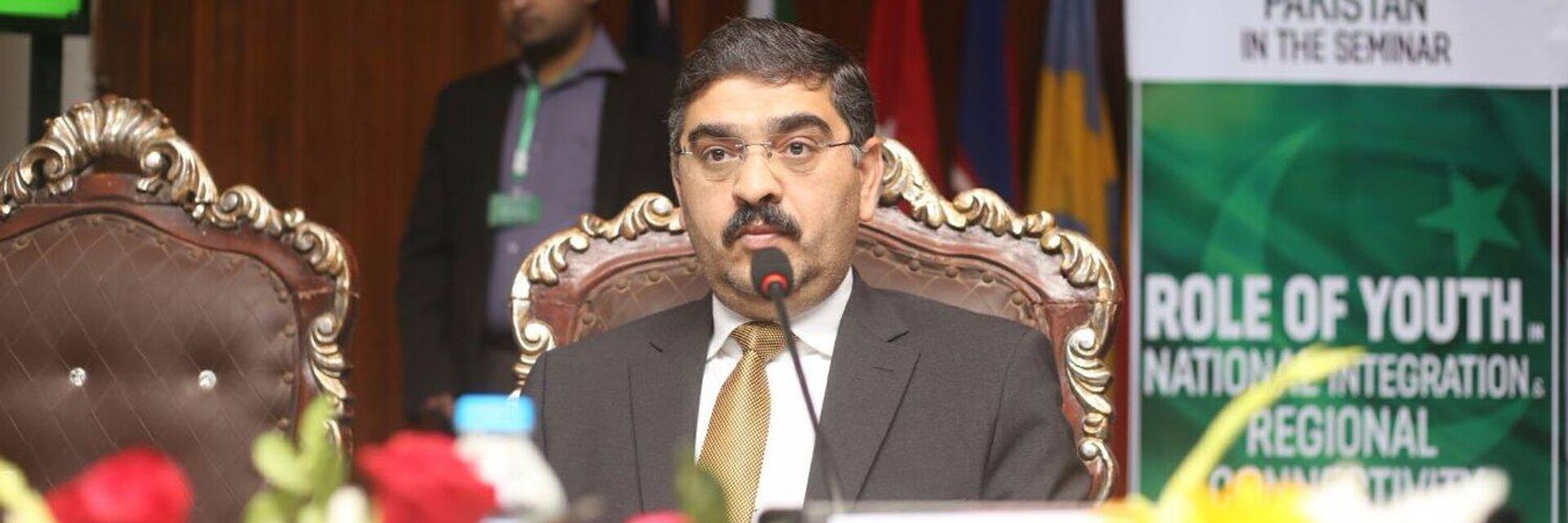https://sputniknews.in/20231126/securing-cpec-pakistan-seeks-to-protect-chinese-nationals-amid-terrorist-threat-5592365.html
Securing CPEC: Pakistan Seeks to Protect Chinese Nationals Amid Terrorist Threat
Securing CPEC: Pakistan Seeks to Protect Chinese Nationals Amid Terrorist Threat
Sputnik India
There is a threat emerging for Chinese nationals after the news of the merger of separatist and militant groups in Balochistan came to surface; therefore, local officials insist on the safety and security of Chinese citizens working in Pakistan.
2023-11-26T20:34+0530
2023-11-26T20:34+0530
2023-12-06T17:53+0530
sputnik opinion
pakistan
china-pakistan economic corridor (cpec)
balochistan
tehreek-e-taliban pakistan (ttp)
taliban
terrorism
counter-terrorism
terrorist attack
https://cdn1.img.sputniknews.in/img/07e7/09/18/4416908_0:143:2000:1268_1920x0_80_0_0_696a023439cab8a16d083f08320f9703.jpg
The increasing uncertainty concerning the safety and security of Chinese nationals working in Pakistan has emerged as a major problem in recent years. A number of attacks and occurrences of suicide bombings have been directed towards individuals of Chinese nationality, hence raising concerns regarding the safety of Chinese nationals and the overall stability of Pakistan-China ties.Last week, after a high-level security meeting, the Pakistani Interior Ministry stated that Chinese experts and investors engaged in unrelated projects should also be subject to the same rigorous standards as Chinese workers who work on Belt and Road Initiative (BRI) projects. As part of the new protocols, from now on, Chinese nationals must report their residential addresses to the police and transport them exclusively in armored and bullet-proof cars.Balochistan’s Security Conundrum & US Presence: Implications for Pak-China RelationsNews has surfaced that Baloch insurgent groups are planning to make a great alliance in the shape of a reunification of all other Baloch separatist groups (Baloch Liberation Army, Baloch Liberation, UBA, BRA, and LB) in the single forum, which is creating a security threat to Pakistan and the CPEC project, Saindak, and Reko Diq Copper Gold Projects. As per official reports, the targets of these groups are always Pakistan’s security forces and Chinese nationals. Since the beginning of the China-Pakistan Economic Corridor project, Pakistan has witnessed eight significant attacks targeting Chinese investors. More importantly, another militant group known as the Tehrik-e-Taliban Pakistan TTP* is also targeting Chinese investors in Pakistan, which is fanning the flame of attacks and creating two-front threats and challenges for Pakistani states to deal with these militant organizations with multipronged strategies, as Media reports uncovered.“Balochistan, a province of Pakistan and the site of the CPEC project, has long grappled with socio-political and economic instability. The region is home to several separatist militant groups advocating for an independent Baloch state," said Dr. Allah Nazir Baloch, leader of the Baloch Liberation Front, a major separatist group. He also raised concerns about the "extraction of resources from projects like Saindek and Reko Deq Gold mine by foreign companies, including Chinese, Canadian, and Australian entities, without adequate involvement of the Baloch community.”However, in this regard, the frequent visits of the US ambassador to Balochistan within a year, along with the announcement of substantial financial aid of four million dollars for Balochistan's security concerns, have had a dual impact. On one hand, it has exacerbated the security situation in the region, while on the other hand, it has created an atmosphere of uncertainty surrounding China's relationship with Pakistan.To address this emerging issue, a high-level meeting was conducted, attended by key officials and stakeholder such as the chief commissioner of Islamabad, chief secretaries, and representatives from various regions. The Chinese ambassador to Pakistan, prominent Chinese investors, and officials from the security division of the CPEC were also invited. Pakistan is committed to ensuring the safety not only of CPEC personnel but also of all Chinese nationals in the country, as requested by Beijing.Terror Threats: Pakistan's Security Measures for Chinese nationalsThe escalation of major incidents and attacks in the provinces of Khyber Pakhtunkhwa KPK and Balochistan raised concerns. Numerous attacks have been claimed by factions including the Baloch Liberation Army, Baloch Liberation Front, and TTP.Security analysts and media outlets both unveiled that the TTP and separatist groups as potential threats in Pakistan, where the region is having important CPEC initiatives such as the Gwadar deep sea port. Pakistan is taking actions to enhance security measures for Chinese nationals engaged within the nation, in response to Beijing's demand for improved protection against militants. The interior ministry of Pakistan revised the standard operating procedures (SOPs) regarding the protection of Chinese nationals, investors, and experts, especially those participating in the CPEC initiatives, last week. The revised SOPs mandate that Chinese nationals utilize reinforced vehicles and notify the appropriate authorities and police stations prior to their visits.Journalist Kiyya Baloch told Sputnik India, “The conundrum of Balochistan is becoming very complex and tricky day by day; the attacks of Baloch insurgents are becoming fatal for Pakistani state, its security forces and Chinese Nationals.”He said, “On the chessboard of Balochistan and CPEC mega project, the visits of US ambassador, after 15 years in Balochistan, is indicating something new in Pakistani socio-political and security landscape.”Additionally, in the perspective of the provision of high and advanced security to Chinese nationals, Baloch remarked, “If every Chinese investor is provided an armored vehicle and a security detail, the costs could outweigh their investments. It also puts more burden on Pakistan”However, in this regard, Chinese Ministry Spokesperson Wang Wenbin said to media: “China will continue to work with Pakistan to prevent and respond to the threat of terrorism, and effectively protect the safety of Chinese personnel, institutions and projects in Pakistan.”“Any attempt to undermine the China-Pakistan friendship and the construction of the China-Pakistan Economic Corridor (CPEC) will never succeed,” he added.Adnan Aamir, Pakistan based analyst, researcher, and journalist told Sputnik India, “officials of Pakistan insist on law enforcement forces to ensure the security measures of Chinese nationals by providing high protocols and bulletproof cars as separatist merger raises of attacks.”In the context of terror threat to Chinese nationals, he added, “Caretaker PM of Pakistan Anwaar ul Kakar visited China in October where Beijing specifically asked Islamabad to provide security to Chinese personnel working on CPEC as well.”Increasing the US Interest in BalochistanTHE US is cautiously rebuilding its relationship with Pakistan, focusing on critical areas and communities considered vulnerable. The recent visit by US Ambassador Donald Blome to Gwadar is an indication of how the US is strategically approaching its ties with Pakistan. This development is likely to raise concerns in Beijing, which has significant regional economic and strategic investments.Kiyya Baloch, in this regard, told Sputnik India, “the US diplomacy and entrance at this time in Balochistan is a strategic move and would definitely disturb Pak-China relationship.”Recently, Bloom visited Quetta, Balochistan, Pakistan, and during his trip to Quetta, he unveiled a crucial $4-million aid package, in a significant move to bolster Pakistan’s counter-terrorism capabilities.And last month, trip to Gwadar was also likely to have caught Beijing’s attention. According to a press release from the American embassy in Islamabad, the Gwadar visit aimed to explore trade and development opportunities. During his meeting with the Gwadar Chamber of Commerce, Ambassador Blome discussed the potential for US trade and investment in various sectors. The statement emphasized America’s long-standing partnership with Balochistan, including providing aid during the floods that occurred last year.Muhammad Amir Rana, a security analyst said in this regard, “Against China and CPEC project, non-state actors and pressure groups like BLA, BLF and TTP can be used as these groups are already fighting against Pakistan, and China.”Malik Siraj Akbar, a political analyst in Washington based said to print media, “The Baloch militant groups believe that the more they propagate their war against China, the more backing they will get from global players who have problem with China."In general, Pakistan remains determined to enhancing security protocols and fostering collaboration with China in order to safeguard Chinese nationals and investments within the nation.From this standpoint, the government of Pakistan has established specialized security divisions, deployed additional security forces, and implemented surveillance systems in order to safeguard Chinese investments.Therefore, according to security specialists, the most recent security upgrades will deter militants.*A terrorist organization banned in Russia and India.
https://sputniknews.in/20231126/formidable-group-why-pakistan-wants-to-join-brics-5581251.html
pakistan
china-pakistan economic corridor (cpec)
balochistan
Sputnik India
feedback.hindi@sputniknews.com
+74956456601
MIA „Rossiya Segodnya“
2023
Muhammad Sharif
https://cdn1.img.sputniknews.in/img/07e7/0b/05/5257054_0:0:443:444_100x100_80_0_0_b8bd2af32be62a6eecdb4a84c7fd978f.jpg
Muhammad Sharif
https://cdn1.img.sputniknews.in/img/07e7/0b/05/5257054_0:0:443:444_100x100_80_0_0_b8bd2af32be62a6eecdb4a84c7fd978f.jpg
News
en_IN
Sputnik India
feedback.hindi@sputniknews.com
+74956456601
MIA „Rossiya Segodnya“
Sputnik India
feedback.hindi@sputniknews.com
+74956456601
MIA „Rossiya Segodnya“
Muhammad Sharif
https://cdn1.img.sputniknews.in/img/07e7/0b/05/5257054_0:0:443:444_100x100_80_0_0_b8bd2af32be62a6eecdb4a84c7fd978f.jpg
balochistan, pakistan-china progect, cpec, terrorist threat in pakistan
balochistan, pakistan-china progect, cpec, terrorist threat in pakistan
Securing CPEC: Pakistan Seeks to Protect Chinese Nationals Amid Terrorist Threat
20:34 26.11.2023 (Updated: 17:53 06.12.2023) There is a threat emerging for Chinese nationals after the news of the merger of separatist and militant groups in Balochistan came to surface; therefore, local officials insist on the safety and security of Chinese citizens working in Pakistan.
The increasing uncertainty concerning the safety and security of Chinese nationals working in Pakistan has emerged as a major problem in recent years. A number of attacks and occurrences of suicide bombings have been directed towards individuals of Chinese nationality, hence raising concerns regarding the safety of Chinese nationals and the overall stability of Pakistan-China ties.
Last week, after a high-level security meeting, the Pakistani Interior Ministry stated that Chinese experts and investors engaged in unrelated projects should also be subject to the same rigorous standards as Chinese workers who work on Belt and Road Initiative (BRI) projects. As part of the new protocols, from now on, Chinese nationals must report their residential addresses to the police and transport them exclusively in armored and bullet-proof cars.
Balochistan’s Security Conundrum & US Presence: Implications for Pak-China Relations
News has surfaced that Baloch insurgent groups are planning to make a great alliance in the shape of a reunification of all other
Baloch separatist groups (Baloch Liberation Army, Baloch Liberation, UBA, BRA, and LB) in the single forum, which is creating a
security threat to Pakistan and the CPEC project, Saindak, and Reko Diq Copper Gold Projects. As per official reports, the targets of these groups are always Pakistan’s security forces and Chinese nationals. Since the beginning of the China-Pakistan Economic Corridor project, Pakistan has witnessed eight significant attacks targeting Chinese investors. More importantly, another militant group known as the Tehrik-e-Taliban Pakistan TTP* is also targeting Chinese investors in Pakistan, which is fanning the flame of attacks and creating two-front threats and challenges for Pakistani states to deal with these militant organizations with multipronged strategies, as Media reports uncovered.
“Balochistan, a province of Pakistan and the site of the CPEC project, has long grappled with socio-political and economic instability. The region is home to several separatist militant groups advocating for an independent Baloch state," said Dr. Allah Nazir Baloch, leader of the Baloch Liberation Front, a major separatist group. He also raised concerns about the "extraction of resources from projects like Saindek and Reko Deq Gold mine by foreign companies, including Chinese, Canadian, and Australian entities, without adequate involvement of the Baloch community.”
However, in this regard, the frequent visits of the US ambassador to Balochistan within a year, along with the announcement of substantial financial aid of four million dollars for Balochistan's security concerns, have had a dual impact. On one hand, it has exacerbated the security situation in the region, while on the other hand, it has created an atmosphere of uncertainty surrounding China's relationship with Pakistan.
“The relationship between Pakistan and China in the context of the CPEC is complex, especially considering the presence of the US in the region. While both countries enjoy a robust economic partnership through CPEC, but the recent
US presence in Balochistan has the potential to generate tensions and impact their relationship. The fact is that the US ambassador has visited Balochistan twice within a year adds to the uncertainty faced by Chinese investors and the CPEC project, as Chinese already facing threats of separatist groups,”
Kiyya Baloch, Norway based journalist, analyst, and reports on the politics, militancy and violence in Balochistan, told Sputnik India.
According to National Counter Terrorism Authority (NACTA) of Pakistan reports, “International players and their intelligences are involved in Balochistan’s conundrum by supporting militants groups against Pakistani Arm forces and Chinese nationals, and Balochistan has become a hub of hybrid warfare.”
To address this emerging issue, a high-level meeting was conducted, attended by key officials and stakeholder such as the chief commissioner of Islamabad, chief secretaries, and representatives from various regions. The Chinese ambassador to Pakistan, prominent Chinese investors, and officials from the security division of the CPEC were also invited. Pakistan is committed to ensuring the safety not only of CPEC personnel but also of all Chinese nationals in the country, as requested by Beijing.
Terror Threats: Pakistan's Security Measures for Chinese nationals
The escalation of major incidents and attacks in the provinces of Khyber Pakhtunkhwa KPK and Balochistan raised concerns.
Numerous attacks have been claimed by factions including the Baloch Liberation Army, Baloch Liberation Front, and TTP.
Security analysts and media outlets both unveiled that the TTP and separatist groups as potential threats in Pakistan, where the region is having important CPEC initiatives such as the
Gwadar deep sea port. Pakistan is taking actions to enhance security measures for Chinese nationals engaged within the nation, in response to Beijing's demand for improved protection against militants. The interior ministry of Pakistan revised the standard operating procedures (SOPs) regarding the protection of Chinese nationals, investors, and experts, especially those participating in the CPEC initiatives, last week. The revised SOPs mandate that Chinese nationals utilize reinforced vehicles and notify the appropriate authorities and police stations prior to their visits.
Journalist Kiyya Baloch told Sputnik India, “The conundrum of Balochistan is becoming very complex and tricky day by day; the attacks of Baloch insurgents are becoming fatal for Pakistani state, its security forces and Chinese Nationals.”
“The reunification or alliance among Baloch separatist groups would not only aggravate the attacks in more lethal way in Balochistan, but also it will strengthen Baloch political movement in the shape of unity. As a result, this scenario leads toward great turbulence and bottleneck for CPEC project,” he added.
He said, “On the chessboard of Balochistan and CPEC mega project, the visits of US ambassador, after 15 years in Balochistan, is indicating something new in Pakistani socio-political and security landscape.”
Additionally, in the perspective of the provision of high and advanced security to Chinese nationals, Baloch remarked, “If every Chinese investor is provided an armored vehicle and a security detail, the costs could outweigh their investments. It also puts more burden on Pakistan”
However, in this regard, Chinese Ministry Spokesperson Wang Wenbin said to media: “China will continue to work with Pakistan to prevent and respond to the threat of terrorism, and effectively protect the safety of Chinese personnel, institutions and projects in Pakistan.”
“Any attempt to undermine the China-Pakistan friendship and the construction of the China-Pakistan Economic Corridor (CPEC) will never succeed,” he added.
Adnan Aamir, Pakistan based analyst, researcher, and journalist told Sputnik India, “officials of Pakistan insist on law enforcement forces to ensure the security measures of Chinese nationals by providing high protocols and bulletproof cars as separatist merger raises of attacks.”
In the context of terror threat to Chinese nationals, he added, “Caretaker PM of Pakistan Anwaar ul Kakar visited China in October where Beijing specifically asked Islamabad to provide security to Chinese personnel working on CPEC as well.”
Increasing the US Interest in Balochistan
THE US is cautiously rebuilding its relationship with Pakistan, focusing on critical areas and communities considered vulnerable. The recent visit by US Ambassador Donald Blome to Gwadar is an indication of how the US is strategically approaching its ties with Pakistan. This development is likely to raise concerns in Beijing, which has significant regional economic and strategic investments.
Kiyya Baloch, in this regard, told Sputnik India, “the US diplomacy and entrance at this time in Balochistan is a strategic move and would definitely disturb Pak-China relationship.”
Recently, Bloom visited Quetta, Balochistan, Pakistan, and during his trip to Quetta, he unveiled a crucial $4-million aid package, in a significant move to bolster Pakistan’s counter-terrorism capabilities.
And last month, trip to Gwadar was also likely to have caught Beijing’s attention. According to a press release from the American embassy in Islamabad, the Gwadar visit aimed to explore trade and development opportunities. During his meeting with the Gwadar Chamber of Commerce, Ambassador Blome discussed the potential for US trade and investment in various sectors. The statement emphasized America’s long-standing partnership with Balochistan, including providing aid during the floods that occurred last year.
“The two visits of the US Ambassador in Balochistan within a year is indicating a great threat to disturb the triangle of China, Pakistan, and CPEC, and it will definitely fan the flame of hybrid war in the region," one of the political analysts said.
Muhammad Amir Rana, a security analyst said in this regard, “Against China and CPEC project, non-state actors and pressure groups like BLA, BLF and TTP can be used as these groups are already fighting against Pakistan, and China.”
Malik Siraj Akbar, a political analyst in Washington based said to print media, “The Baloch militant groups believe that the more they propagate their war against China, the more backing they will get from global players who have problem with China."
In general, Pakistan remains determined to enhancing security protocols and fostering collaboration with China in order to safeguard Chinese nationals and investments within the nation.
From this standpoint, the government of Pakistan has established specialized security divisions, deployed additional security forces, and implemented surveillance systems in order to safeguard Chinese investments.
Therefore, according to security specialists, the most recent security upgrades will deter militants.
*A terrorist organization banned in Russia and India.
